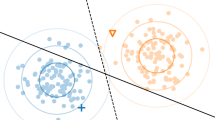Abstract
The main principles of the JSM method for automatic hypothesis generation are considered along with the problems of its development. The formalization of J.S. Mill’s joint method of agreement and difference is proposed and the concept of a JSM strategy is defined. The article also considers two possible development directions of artificial intelligence and its connection with cognitive research.
Similar content being viewed by others
References
JSM-metod avtomaticheskogo porozhdeniya gipotez: logicheskiye i epistemologicheskiye osnovaniya (JSM-Method for Automatic Hypothesis Generation: Logical and Epistemological Foundations), Anshakov, O.M., Fabrikantova, Ye.F., compilers; Anshakov, O.M., Ed., Moscow: Librokom, 2009.
Avtomaticheskoye porozhdeniye gipotez v intellektualnykh sistemakh (Automatic Hypothesis Generation in Intelligent Systems), Finn, V.K., Ed., Moscow: Librokom, 2009.
Arskii, Yu.M. and Finn, V.K., Design Principles of Intelligent Systems in Informatsionnyie teknologii i vychislitelnyie sisyemy (Information Technologies and Computer Systems), 2008, no. 4, pp. 4–37.
Mill, J.S., A System of Logic: Ratiocinative and Inductive, Whitefish: Kessinger Publishing, 2004.
Rosser, J.B. and Turquette, A.R., Many-Valued Logics, Amsterdam: North-Holland Publ., 1952.
Multivalued Logics and Their Applications, in Logiki v sistemakh iskusstvennogo intellekta (Logics in the Systems of Artificial Intelligence) Finn, V.K., Ed., Moscow: LKI, 2008, vol. 2, ch. 2, pp. 113–235.
Popper, K.R., Evolutionary Epistemology, in Evolutsionnaya epistemologiya i logika sotsialnykh nauk. Karl Popper i yego kritiki (Evolutionary Epistemology and Logic of Social Sciences. Karl Popper and his Critics), Moscow: Editorial URSS, 2000, pp. 57–74.
Abductive Inference: Computation, Philosophy, Technology, Josephson, J.R. and Josephson, S.G., Eds., Cambridge Univ. Press, 1994.
Popper, K. R., Objective Knowledge: an Evolutionary Approach., Oxford: Clarendon Press, 1979
Bochvar, D.A., On a Three-Valued Calculus and its Application to the Analysis of Paradoxes of Expanded Functional Caluclus, in Logiki v sistemakh iskusstvennogo intellekta (Logics in the Systems of Artificial Intelligence) Finn, V.K., Ed., Moscow: LKI, 2008, vol. 1, Ch. 2, pp. 23–46.
Finn, V.K., On Structural Cognitology: Phenomenology of Consciousness from the Viewpoint of Artificial Intelligence, Voprosy filosofii, 2009, no. 1, pp. 88–103.
Prakticheskii intellekt (Practical Intelligence) Sternberg R., Gen. Ed., St. Petersburg, 2002.
Solso, R.L., Cognitive psychology. Boston, Sydney, Toronto: Allyn & Bacon. Inc., 1988.
Finn, V.K., On Data Mining, in Novosti iskusstvennogo intellekta (Artificial Intelligence News), 2004, no. 3, pp. 3–18.
Jackson, P., Introduction to expert systems, Harlow: Addison, 1999
Durkheim, E., Rules of Sociological Mehtod Selected Writings, Cambridge: Cambridge University Press, 1972.
Lancaster, F.W., Information Retrieval Systems: Characteristics, Testing and Evaluation, New York: Wiley; 1979.
Gaek, P. and Gavranek, T., Avtomaticheskoye porozhdeniye gipotez: matematicheskiye osnovy obshchey teorii (Automatic Hypothesis Generation: Mathematical Foundations of the General theory) Moscow: Nauka, 1984.
McCarthy, J., From Here to Human-Level AI, in Artificial Intelligence, 2007, vol. 171, pp. 1174–1182.
Finn, V.K., Intellektualnyie systemi i obshchestvo (Intelligent Systems and Society), Moscow: KomKniga, 2007, pp. 286–321.
Wertheimer, M., Productive thinking, New York and London: Harper, 1945.
Boden, M.A., Mind as Machine: A History of Cognitive Science: 2 volumes, Oxford: Clarendon, 2006.
Boden, M.A., Odd Man Out: Reply to Reviewers, in Artificial Intelligence, 2008, vol. 172, pp. 1944–1964.
Budushcheye iskusstvennogo intellekta (The Future of Artificial Intelligence), Levitin K. Ye. and Pospelov, D.A., Eds., Moscow: Nauka, 1991.
Pospelov, D.A., Modelirovaniye rassuzhdenii (Reasoning Simulation), Moscow: Radio i Svyaz, 1989.
Pospelov, D.A., Situatsionnoye upravleniye. Teoriya i praktika (Situation Management. Theory and Practice), Moscow: Nauka, 1986.
McCarthy, J., The Well-Designed Child, Artificial Intelligence, 2008, vol. 172, pp. 2003–2014.
Inhelder, B., and Piaget, J., The Growth of Logical Thinking from Childhood to Adolescence, New York: Basic Books, 1958.
Luger, G.F., Artificial Intelligence: Structures and Strategies for Complex Problem Solving, 6th ed., Boston: Addison-Wesley Pearson Education, 2009.
McDermott, D. and Doyle, J., Non-Monotonic Logic I, Artificial Intelligence, 1980, vol. 13, pp. 14–72.
Jaspers, K., Allgemeine Psycho-Pathologie, Berlin-Heidelberg-New York: Springer-Verlag, 1973.
Additional information
Original Russian Text © V.K. Finn, 2009, published in Nauchno-Tekhnicheskaya Informatsiya, Seriya 2, 2009, No. 8, pp. 15–26.
About this article
Cite this article
Finn, V.K. Timely notes about the JSM method for automatic hypothesis generation. Autom. Doc. Math. Linguist. 43, 257–269 (2009). https://doi.org/10.3103/S0005105509050021
Received:
Published:
Issue Date:
DOI: https://doi.org/10.3103/S0005105509050021




